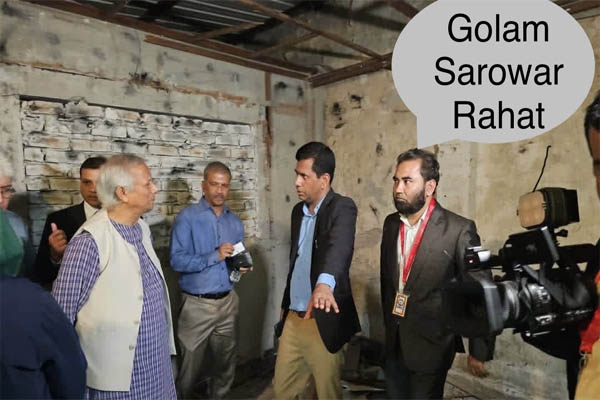
Terrorist leader accompanies Muhammad Yunus Visit to DGFI Facility Aynaghar
Agartala, Feb 13, 2025, By Our Correspondent179
The Chief Advisor of the interim government, Muhammad Yunus, visited the Directorate General of Defense Intelligence (DGFI) Joint Interrogation Cell, also known as “Ayanaghar,” yesterday at noon. The visit has drawn controversy as reports suggest that Yunus was accompanied by an active member of the banned terrorist outfit Jamayatul Mujahideen Bangladesh (JMB), Gholam Sarwar Rahat.
Sources indicate that Rahat’s presence during the visit is a significant revelation, further strengthening allegations of Yunus’s suspected ties to terrorists. This latest development raises renewed concerns about the interim government’s approach to militancy and counterterrorism measures.
Background on JMB and Gholam Sarwar Rahat
JMB is a notorious terrorist group in Bangladesh, known for its involvement in violent attacks and terror-related activities. One of the most alarming incidents associated with the group occurred on February 23, 2014, in Trishal, Mymensingh. That day, a heavily armed group of 15-20 militants ambushed a police convoy in an attempt to free three convicted JMB operatives. The assailants opened fire on prison guards and detonated explosives, resulting in the deaths of three police constables.
Security forces later arrested six JMB operatives linked to the attack: Gholam Sarwar Rahat, Azmir, Al-Amin, Zakaria, Russell, and Syed Ziaul Islam. Rahat, now identified as an active JMB member, was reportedly the Chief Advisor’s primary companion during his visit to “Ayanaghar.”
JMB’s Presence Beyond Bangladesh
JMB has also been linked to extremist activities outside Bangladesh, particularly in India. Indian security agencies have reported multiple instances of JMB’s involvement in planned terror activities, including recruitment, radicalization, and arms smuggling across the border. The group has been implicated in bombings and assassination plots, further cementing its reputation as a transnational threat. Indian authorities have increased surveillance and conducted multiple crackdowns on JMB sleeper cells operating in states like West Bengal, Assam, and Jharkhand.
Concerns Over Terrorist Ties
This is not the first time suspicions have been raised regarding Yunus’s alleged connections to extremists. Over the past few months, he has been involved in facilitating the release of several hardline militants from prisons across Bangladesh. His actions have drawn sharp criticism from security analysts and political observers, who argue that such decisions could undermine national counterterrorism efforts.
The presence of a convicted JMB member alongside a high-ranking government official raises critical questions about the administration’s policies and its commitment to countering terrorism. As investigations into these developments continue, this association could have serious implications for national security and political stability.
Authorities have yet to release an official statement regarding the matter, but security experts stress the need for heightened vigilance and transparency in government dealings with individuals connected to extremist organizations.